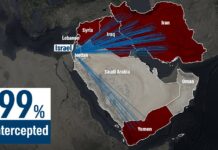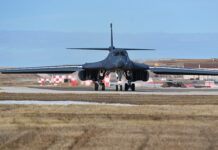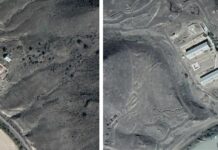Reports of apparent Israeli airstrikes on the Iran cities of Isfahan and Tabriz during the night of 18/19 April 2024, in response to the Iranian attack on Israel on the night of 13 April, have left a confused picture of what actually happened and what its effects were.
Video footage of explosions over Isfahan posted by local residents on social media channels appeared to only show shell bursts from Iranian anti-aircraft fire, with Iran subsequently playing down the raids, claiming its air defences had shot down three unmanned aerial vehicles (UAVs) close to an airbase in Isfahan province that were possibly launched from inside Iran.
Isfahan contains a number of potential targets for Israel, including nuclear facilities and an airbase, but the International Atomic Energy Agency confirmed that there had been no damage to Iran’s nuclear sites, while satellite imagery obtained by CNN from Umbra Space appeared to show no significant damage at the air base at Isfahan.
The Israeli Defence Forces (IDF) do not typically acknowledge the attacks they conduct, but US officials told the G7 nations that the US government had received last-minute indications from Israel that an attack would take place.
In the wake of the substantial but ineffective Iran barrage launched against Israel on 13 April, which involved more than 300 missiles and UAVs, the Israeli attack on Iran appears very modest in comparison. Given that an Israeli war cabinet had been debating for days how to response to the Iranian attack on Israel – itself a response to an Israeli air strike on the Iranian Consulate in Damascus on 1 April that killed Quds Force commander Brigadier General Mohammad Reza Zahedi – the Israeli response thus appears to be more of a message to Tehran, suggesting that a much more lethal attack could be mounted if Israel chose to do so.
Unlike Israel’s air and missile defences, which were claimed by the IDF to have thwarted 99% of the Iranian air threats on 13 April, Iran’s mix of older Russian, Chinese and indigenously produced air defence assets would struggle to cope with a significant Israeli barrage.
Meanwhile, the international community observing from the sidelines are hoping the modest Israeli attack will ultimately prove to be a de-escalation – rather than an escalation – of the current hostilities, especially given Tehran’s playing down of the attack.













